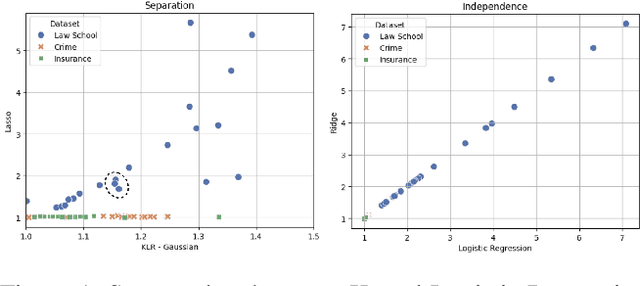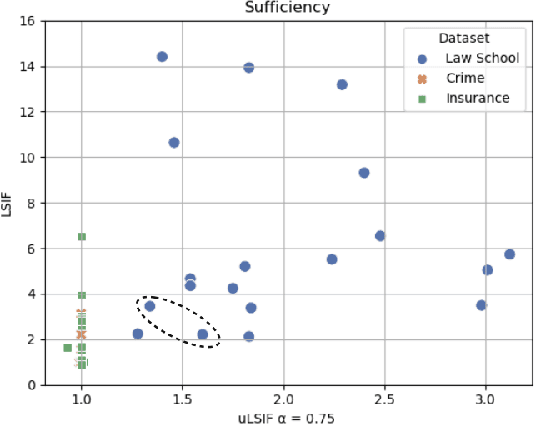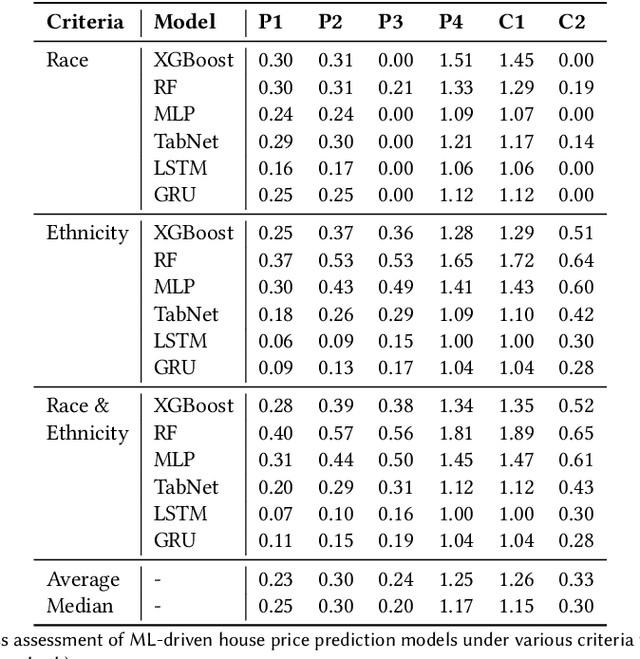Abdalwahab Almajed
A Comprehensive Evaluation of the Sensitivity of Density-Ratio Estimation Based Fairness Measurement in Regression
Aug 20, 2025



Abstract:The prevalence of algorithmic bias in Machine Learning (ML)-driven approaches has inspired growing research on measuring and mitigating bias in the ML domain. Accordingly, prior research studied how to measure fairness in regression which is a complex problem. In particular, recent research proposed to formulate it as a density-ratio estimation problem and relied on a Logistic Regression-driven probabilistic classifier-based approach to solve it. However, there are several other methods to estimate a density ratio, and to the best of our knowledge, prior work did not study the sensitivity of such fairness measurement methods to the choice of underlying density ratio estimation algorithm. To fill this gap, this paper develops a set of fairness measurement methods with various density-ratio estimation cores and thoroughly investigates how different cores would affect the achieved level of fairness. Our experimental results show that the choice of density-ratio estimation core could significantly affect the outcome of fairness measurement method, and even, generate inconsistent results with respect to the relative fairness of various algorithms. These observations suggest major issues with density-ratio estimation based fairness measurement in regression and a need for further research to enhance their reliability.
Machine Learning Fairness in House Price Prediction: A Case Study of America's Expanding Metropolises
May 02, 2025



Abstract:As a basic human need, housing plays a key role in enhancing health, well-being, and educational outcome in society, and the housing market is a major factor for promoting quality of life and ensuring social equity. To improve the housing conditions, there has been extensive research on building Machine Learning (ML)-driven house price prediction solutions to accurately forecast the future conditions, and help inform actions and policies in the field. In spite of their success in developing high-accuracy models, there is a gap in our understanding of the extent to which various ML-driven house price prediction approaches show ethnic and/or racial bias, which in turn is essential for the responsible use of ML, and ensuring that the ML-driven solutions do not exacerbate inequity. To fill this gap, this paper develops several ML models from a combination of structural and neighborhood-level attributes, and conducts comprehensive assessments on the fairness of ML models under various definitions of privileged groups. As a result, it finds that the ML-driven house price prediction models show various levels of bias towards protected attributes (i.e., race and ethnicity in this study). Then, it investigates the performance of different bias mitigation solutions, and the experimental results show their various levels of effectiveness on different ML-driven methods. However, in general, the in-processing bias mitigation approach tends to be more effective than the pre-processing one in this problem domain. Our code is available at https://github.com/wahab1412/housing_fairness.
On the Consistency of Fairness Measurement Methods for Regression Tasks
Jun 19, 2024Abstract:With growing applications of Machine Learning (ML) techniques in the real world, it is highly important to ensure that these models work in an equitable manner. One main step in ensuring fairness is to effectively measure fairness, and to this end, various metrics have been proposed in the past literature. While the computation of those metrics are straightforward in the classification set-up, it is computationally intractable in the regression domain. To address the challenge of computational intractability, past literature proposed various methods to approximate such metrics. However, they did not verify the extent to which the output of such approximation algorithms are consistent with each other. To fill this gap, this paper comprehensively studies the consistency of the output of various fairness measurement methods through conducting an extensive set of experiments on various regression tasks. As a result, it finds that while some fairness measurement approaches show strong consistency across various regression tasks, certain methods show a relatively poor consistency in certain regression tasks. This, in turn, calls for a more principled approach for measuring fairness in the regression domain.
 Add to Chrome
Add to Chrome Add to Firefox
Add to Firefox Add to Edge
Add to Edge